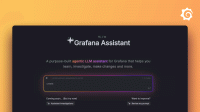This is documentation for the next version of Grafana Alloy Documentation. For the latest stable release, go to the latest version.
discovery.scaleway
discovery.scaleway discovers targets from Scaleway instances and bare metal services.
Usage
discovery.scaleway "<LABEL>" {
project_id = "<SCALEWAY_PROJECT_ID>"
role = "<SCALEWAY_PROJECT_ROLE>"
access_key = "<SCALEWAY_ACCESS_KEY>"
secret_key = "<SCALEWAY_SECRET_KEY>"
}Arguments
You can use the following arguments with discovery.scaleway:
The role argument determines what type of Scaleway machines to discover.
It must be set to one of the following:
"baremetal": Discover bare metal Scaleway machines."instance": Discover virtual Scaleway instances.
The name_filter and tags_filter arguments can be used to filter the set of discovered servers.
name_filter returns machines matching a specific name, while tags_filter returns machines who contain all the tags listed in the tags_filter argument.
no_proxy can contain IPs, CIDR notations, and domain names. IP and domain names can contain port numbers.
proxy_url must be configured if no_proxy is configured.
proxy_from_environment uses the environment variables HTTP_PROXY, HTTPS_PROXY, and NO_PROXY (or the lowercase versions thereof).
Requests use the proxy from the environment variable matching their scheme, unless excluded by NO_PROXY.
proxy_url and no_proxy must not be configured if proxy_from_environment is configured.
proxy_connect_header should only be configured if proxy_url or proxy_from_environment are configured.
Blocks
You can use the following blocks with discovery.scaleway:
tls_config
The tls_config block configures TLS settings for connecting to the endpoint.
The following pairs of arguments are mutually exclusive and can’t both be set simultaneously:
ca_pemandca_filecert_pemandcert_filekey_pemandkey_file
When configuring client authentication, both the client certificate (using cert_pem or cert_file) and the client key (using key_pem or key_file) must be provided.
When min_version isn’t provided, the minimum acceptable TLS version is inherited from Go’s default minimum version, TLS 1.2.
If min_version is provided, it must be set to one of the following strings:
"TLS10"(TLS 1.0)"TLS11"(TLS 1.1)"TLS12"(TLS 1.2)"TLS13"(TLS 1.3)
Exported fields
The following fields are exported and can be referenced by other components:
When role is baremetal, discovered targets include the following labels:
__meta_scaleway_baremetal_id: The ID of the server.__meta_scaleway_baremetal_name: The name of the server.__meta_scaleway_baremetal_os_name: The operating system name of the server.__meta_scaleway_baremetal_os_version: The operating system version of the server.__meta_scaleway_baremetal_project_id: The project ID the server belongs to.__meta_scaleway_baremetal_public_ipv4: The public IPv4 address of the server.__meta_scaleway_baremetal_public_ipv6: The public IPv6 address of the server.__meta_scaleway_baremetal_status: The current status of the server.__meta_scaleway_baremetal_tags: The list of tags associated with the server concatenated with a,.__meta_scaleway_baremetal_type: The commercial type of the server.__meta_scaleway_baremetal_zone: The availability zone of the server.
When role is instance, discovered targets include the following labels:
__meta_scaleway_instance_boot_type: The boot type of the server.__meta_scaleway_instance_hostname: The hostname of the server.__meta_scaleway_instance_id: The ID of the server.__meta_scaleway_instance_image_arch: The architecture of the image the server is running.__meta_scaleway_instance_image_id: The ID of the image the server is running.__meta_scaleway_instance_image_name: The name of the image the server is running.__meta_scaleway_instance_location_cluster_id: The ID of the cluster for the server’s location.__meta_scaleway_instance_location_hypervisor_id: The hypervisor ID for the server’s location.__meta_scaleway_instance_location_node_id: The node ID for the server’s location.__meta_scaleway_instance_name: The name of the server.__meta_scaleway_instance_organization_id: The organization ID that the server belongs to.__meta_scaleway_instance_private_ipv4: The private IPv4 address of the server.__meta_scaleway_instance_project_id: The project ID the server belongs to.__meta_scaleway_instance_public_ipv4: The public IPv4 address of the server.__meta_scaleway_instance_public_ipv6: The public IPv6 address of the server.__meta_scaleway_instance_region: The region of the server.__meta_scaleway_instance_security_group_id: The ID of the security group the server is assigned to.__meta_scaleway_instance_security_group_name: The name of the security group the server is assigned to.__meta_scaleway_instance_status: The current status of the server.__meta_scaleway_instance_tags: The list of tags associated with the server concatenated with a,.__meta_scaleway_instance_type: The commercial type of the server.__meta_scaleway_instance_zone: The availability zone of the server.
Component health
discovery.scaleway is only reported as unhealthy when given an invalid configuration.
In those cases, exported fields retain their last healthy values.
Debug information
discovery.scaleway doesn’t expose any component-specific debug information.
Debug metrics
discovery.scaleway doesn’t expose any component-specific debug metrics.
Example
discovery.scaleway "example" {
project_id = "<SCALEWAY_PROJECT_ID>"
role = "<SCALEWAY_PROJECT_ROLE>"
access_key = "<SCALEWAY_ACCESS_KEY>"
secret_key = "<SCALEWAY_SECRET_KEY>"
}
prometheus.scrape "demo" {
targets = discovery.scaleway.example.targets
forward_to = [prometheus.remote_write.demo.receiver]
}
prometheus.remote_write "demo" {
endpoint {
url = "<PROMETHEUS_REMOTE_WRITE_URL>"
basic_auth {
username = "<USERNAME>"
password = "<PASSWORD>"
}
}
}Replace the following:
<SCALEWAY_PROJECT_ID>: The project ID of your Scaleway machines.<SCALEWAY_PROJECT_ROLE>: Set tobaremetalto discover bare metal machines orinstanceto discover virtual instances.<SCALEWAY_ACCESS_KEY>: Your Scaleway API access key.<SCALEWAY_SECRET_KEY>: Your Scaleway API secret key.<PROMETHEUS_REMOTE_WRITE_URL>: The URL of the Prometheus remote_write-compatible server to send metrics to.<USERNAME>: The username to use for authentication to theremote_writeAPI.<PASSWORD>: The password to use for authentication to theremote_writeAPI.
Compatible components
discovery.scaleway has exports that can be consumed by the following components:
- Components that consume Targets
Note
Connecting some components may not be sensible or components may require further configuration to make the connection work correctly. Refer to the linked documentation for more details.



